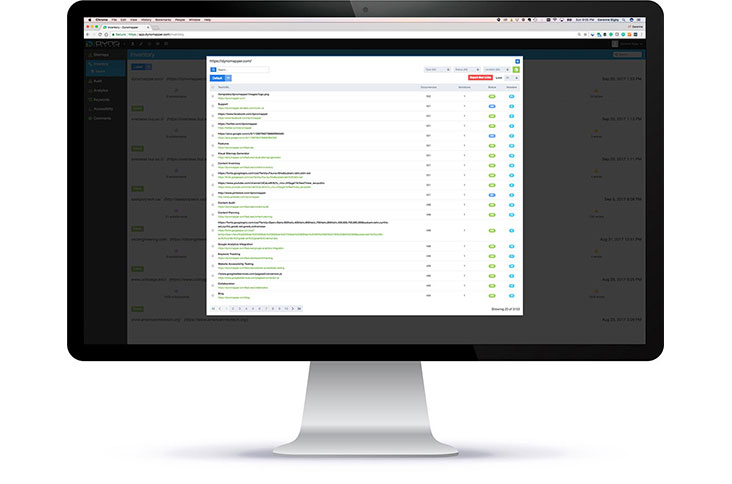Website Content Inventory
Inventory websites and find out how many subdomains, pages, images, documents, videos, audio, and files are within a website or online application. Search, sort, and filter inventory information based on inventory type, status, and location. After finding exactly what you are looking for, you can export lists for quick relief from content headaches. Each page on the sitemap will also display the corresponding inventory information per page.

INVENTORY
All Assets
Cataloging the entire contents of a website can be daunting and inaccurate if you are doing this manually with a spreadsheet. Itemize each subdomain, page, image, document, video, audio, and file that is within a website or online application.
Public or Private
Inventory public or private websites and online applications using basic authentication, cms authentication, or by using our custom system login feature for custom forms.
HTML or JavaScript
It can be difficult to create an inventory of a JavaScript website or application. Our system is flexible and allows for the inventory regardless of the technology used to create your web property.
FILTER
Content Type
All of the content inventory assets can be filtered by content type by selecting the Type drop-down to choose from pages, images, documents, videos, and files.
HTTP Status Code
All of the content inventory assets can be filtered by HTTP status code by selecting the Status drop-down to choose from ok, bad links, redirects, and unknown errors.
Location
All of the content inventory assets can be filtered by location by selecting the Location drop-down to choose from internal or external to view assets contained locally or from an external domain.
SEARCH
URL
Search the entire content inventory using the provided search box and functionality. Search by any asset's public or private URL to find exactly what you are looking for.
Page Title
Search by page title to find any public or private page contained in your content inventory and find URL details, internal linking details, and variations of the searched page.
Subdirectory or Subdomain
Search the content inventory for pages within a subdirectory or subdomain by using the search bar to enter the base URL of the subdirectory or subdomain to see corresponding assets.
EXPORT
All Occurrences
Export each and every occurrence (internal linking) of a content inventory asset to CSV for easy import into Microsoft Excel or any other spreadsheet program.
Excel Compatible
CSV (comma-separated values) is a simple file format that is ideal for the transfer of a large amount of data and can be easily imported into spreadsheet programs like Microsoft Excel.
Saved Exports
Each CSV export is saved with time and date stamp to your content inventory export section so you can access this later and have a backup in case you need to review again.
Who Uses DYNO Mapper?
From digital agencies to universities, government organizations to enterprise marketers—thousands rely on DYNO Mapper to plan, optimize, and communicate complex website structures using visual sitemaps.
Get Started with DYNO Mapper
Join thousands of professionals using the most advanced visual sitemap tool to simplify discovery, IA, and content planning.
👉 Start Your Free Trial — No credit card required.







